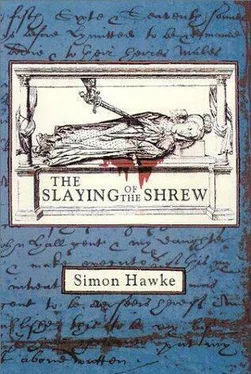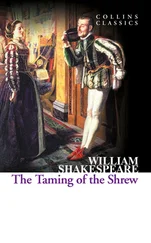Simon Hawke - The Slaying Of The Shrew
Здесь есть возможность читать онлайн «Simon Hawke - The Slaying Of The Shrew» весь текст электронной книги совершенно бесплатно (целиком полную версию без сокращений). В некоторых случаях можно слушать аудио, скачать через торрент в формате fb2 и присутствует краткое содержание. Жанр: Исторический детектив, на английском языке. Описание произведения, (предисловие) а так же отзывы посетителей доступны на портале библиотеки ЛибКат.
- Название:The Slaying Of The Shrew
- Автор:
- Жанр:
- Год:неизвестен
- ISBN:нет данных
- Рейтинг книги:5 / 5. Голосов: 1
-
Избранное:Добавить в избранное
- Отзывы:
-
Ваша оценка:
- 100
- 1
- 2
- 3
- 4
- 5
The Slaying Of The Shrew: краткое содержание, описание и аннотация
Предлагаем к чтению аннотацию, описание, краткое содержание или предисловие (зависит от того, что написал сам автор книги «The Slaying Of The Shrew»). Если вы не нашли необходимую информацию о книге — напишите в комментариях, мы постараемся отыскать её.
The Slaying Of The Shrew — читать онлайн бесплатно полную книгу (весь текст) целиком
Ниже представлен текст книги, разбитый по страницам. Система сохранения места последней прочитанной страницы, позволяет с удобством читать онлайн бесплатно книгу «The Slaying Of The Shrew», без необходимости каждый раз заново искать на чём Вы остановились. Поставьте закладку, и сможете в любой момент перейти на страницу, на которой закончили чтение.
Интервал:
Закладка:
The ditches that ran down the middle of each street trickled with a stinking quagmire of every sort of waste, including human and animal, raising a stench that was enough to take the starch out of a pleated ruff. And for those who could not navigate these streets from the relative safety of a carriage or a perch on horseback, it was a constant hazard to be splashed with the awful ooze, or to lose one’s footing on the slippery cobbles. Not a few elegant suits of clothes in evidence on the streets were inelegantly bespattered, and those that were not bore testimony to the light-footedness of their owners.
At the same time, however, London was full to brimming with a sense of energy and purpose that Shakespeare found invigorating and even intoxicating. Unlike his sleepy home village of Stratford, this was a place where things were happening all the time. Here in these teeming streets, and behind those doors, fortunes were being made and lost and people struggled to survive, to live and love, sometimes with passion worthy of a poet’s muse, and sometimes with a dull, rutting mindlessness that was nothing more than some primitive, instinctual affirmation of existence. It was all here, the base and the sublime, the endless drama of human character and existence that he found so endlessly fascinating and compelling. Just being here made him feel alive.
To him, this was the true theatre, whose machinations he wanted his more artificial theatre to reflect. There was an ongoing drama unfolding in these streets that was far more essential, far more basic, far more tragic, comedic, and uplifting than anything that was currently being acted on the stage. Compared to all of this, he thought, as his alert gaze swept the streets around him, how tawdry, how simple-minded and how utterly banal were the highjinks, jokes and caperings indulged in by the players of the day. All that petty posturing, all those silly, ribald songs, all those grandiloquent speeches said nothing at all about the piece of work man truly was. The ancient Greeks had understood something that men like Greene and his academic cronies seemed to have forgotten, and that was that the highest king could have at heart the motives of the basest peasant, and the meanest menial could possess nobility that would surpass that of the highest king.
The carriage had slowed considerably when they had entered the city and now, as it turned down a winding, narrow street, it slowed even more as the driver scanned the buildings carefully, unsure of his surroundings. Shakespeare called out to him, “Just a short way further on! Look for the sign of the mortar and the pestle!”
Moments later, the driver was reining in before a small apothecary shop on the ground floor of a small, two-story timbered house, crammed wall-to-wall in a row with other similar houses that lined the narrow, winding street. Above the heavy, planked front door hung a wooden sign with a mortar and a pestle painted on it, identifying the apothecary shop.
“Wait here,” Shakespeare said to the driver, rather superfluously, for of course the man would wait. He had been ordered to take him there and back. The driver merely glanced at him with disdain and said nothing.
The shop was still open for business, so Shakespeare went straight in. The strong aroma of herbs filled the air inside the shop.
It was the same curious, yet somehow comforting mixture of rich smells he remembered from the first time he had visited the shop, together with Tuck Smythe, Dick Burbage, and Elizabeth Darcie. The door shut behind him with a loud, protracted creaking sound, accented by a soft tinkling of small bells tied to a cord. A profusion of herbs hung drying from the ceiling beams in bunches, dozens and dozens of them, giving the ceiling the appearance of a hanging garden. From one instant to the next, depending upon where he stood, different odors wafted over him, some familiar, like rosemary, fennel, thyme and basil, others strange and exotic. Wooden shelves from floor to ceiling lined all four walls, each shelf holding a wide assortment of earthenware jars of various sizes. In front of one row of shelves, to his left as he entered the shop, stood a long wooden counter upon which were spread cutting boards and mixing bowls, mortars and pestles, scales with weights and measures, scoops, funnels, scissors, knives and various other tools, some of which he could not even identify. For all the clutter, however, there was not a speck of dirt or dust anywhere in evidence.
A hanging cloth embroidered with the symbols of the zodiac was pushed aside and a tall, almost skeletal-looking man in a long black robe stepped out. His dark eyes were deeply set, giving them a hooded aspect, and his features were lined and gaunt. He had high, prominent cheekbones and a high forehead with long, wispy, snow white hair cascading down over his shoulders from beneath a woven skullcap. His face was set into what appeared to be a perpetual expression of somberness. Once again, Shakespeare thought that he looked like the very image of a sorcerer, only instead of having a dramatic name like Merlin Ambrosius or Asmodeus or some other suitably necromantic appellation, he bore the rather prosaic and innocuous name of Freddy.
“Good day to you, Master Shakespeare,” Freddy said, greeting him with a slight bow.
“ ‘Allo, Freddy. I am pleased to see that you remembered me.”
“Indeed, I do remember, sir. And if I had not, then Meg would have reminded me. She told me that we might be expecting you today.”
“Did she?” The poet shook his head, smiling. “Your good wife continues to amaze me, Freddy. And did she also, by any chance, happen to tell you on what errand I would come?”
“A grave errand, Master Shakespeare.”
The smile slipped from Shakespeare’s face. “Aye. A grave errand, indeed. I trust that she will see me then?”
“But of course,” said Freddy, standing aside and beckoning him through the doorway. “This way, sir.”
The poet went through as Freddy held aside the hanging cloth and together they proceeded to the back of the dimly lit shop, towards a steep and narrow flight of stairs against the far wall. Shakespeare slowly climbed the creaky wooden stairs until he came out through the floor of the living quarters on the second story. It was a narrow, one-room apartment, longer than it was wide, with whitewashed walls and a planked wood floor that was, unlike the floor in the shop below, not covered with rushes, but swept bare and kept immaculately clean.
At the far end of the room was the only window, looking out over the street below. It was partially hidden by a free-standing wooden shelf that also functioned as a divider to screen off the sleeping area in the back. Nothing at all had changed since the last time he was here. The furnishings were still simple and rough-hewn, consisting of not much more than a couple of sturdy wooden chairs, several three-legged stools and a number of large, old-looking wooden chests. A rectangular wood-planked table similar to those that one might find in any tavern stood in the center of the room, before a fireplace.
Except in the homes of the wealthy, fireplaces on the second floor were simply unheard of. In thatch-roofed country homes, where the ceilings on the upper floors were usually just the dry thatch on the roof, the fire hazard would have been extreme, to say nothing of the flammability of the rushes strewn upon the floors.
However, there were no rushes scattered here, and the ceiling was planked and wood-beamed, not thatch. With the exception of a couple of candles, the flames from the hearth provided most of the light in the room, and there were several black cauldrons of various sizes hanging from iron hooks over the fire. In his mind’s eye, the unbidden image of three witches came to him as they stood over the cauldrons, stirring the bubbling brew and cackling to themselves. He shook his head and smiled at his own foolishness, yet at the same time, his surroundings were very much conducive to that sort of vision.
Читать дальшеИнтервал:
Закладка:
Похожие книги на «The Slaying Of The Shrew»
Представляем Вашему вниманию похожие книги на «The Slaying Of The Shrew» списком для выбора. Мы отобрали схожую по названию и смыслу литературу в надежде предоставить читателям больше вариантов отыскать новые, интересные, ещё непрочитанные произведения.
Обсуждение, отзывы о книге «The Slaying Of The Shrew» и просто собственные мнения читателей. Оставьте ваши комментарии, напишите, что Вы думаете о произведении, его смысле или главных героях. Укажите что конкретно понравилось, а что нет, и почему Вы так считаете.












